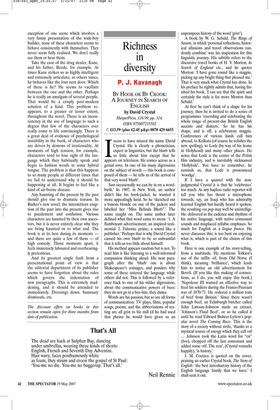Richness in diversity
P. J. Kavanagh
BY HOOK OR BY CROOK: A JOURNEY IN SEARCH OF ENGLISH by David Crystal HarperPress, £16.99, pp. 314, ISBN 975007235582 ✆ £13.59 (plus £2.45 p&p) 0870 429 6655 Iseem to have missed the name David Crystal. He is clearly a phonetician, expert in linguistics, but the blurb tells us little about him except that he appears on television. He comes across as a genial cove. In one of his many digressions on the subject of words — this book is composed of them — he tells us of the arrival of that very word ‘blurb’.
‘Just occasionally we can be in on a wordbirth.’ In 1907, in New York, an author didn’t like his book-jacket, he wanted it more appealingly lurid. So he ‘sketched out a buxom blonde on one of the jackets and labelled her “Miss Belinda Blurb”.’ The name caught on. The same author later defined what that word came to mean. ‘1. A flamboyant advertisement; an inspired testimonial. 2. Fulsome praise; a sound like a publisher.’ Perhaps that is why David Crystal caused his own blurb to be so unboastful that it tells us too little about himself.
His method appears random but is not. To read him is like listening to a well-informed companion thinking aloud. His next paragraph after the ‘blurb’ one is about Shakespeare’s coinages, and ponders why some of these entered the language while others did not. This is followed by a reference back to one of his wilder digressions, about the communicative powers of bees: they do not go in a bee-line, they dance.
Words are his passion, but so are all forms of communication: TV plays, films, popular songs, poems, and the abbreviations of texting are all grist to his mill (if he had used that phrase he would have given us an unpompous history of the word ‘grist’).
A book by W. G. Sebald, The Rings of Saturn, in which ‘personal reflections, historical allusions and travel observations randomly combine’ was his inspiration for this linguistic journey. His subtitle refers to the discursive travel books of H. V. Morton, In Search of England etc., and he quotes Morton: ‘I have gone round like a magpie, picking up any bright thing that pleased me.’ That is very much what Crystal has done. In his preface he rightly admits that, having finished his book, ‘I can see that the spirit and certainly the style is far more Morton than Sebald.’ At first he can’t think of a shape for his journey, then he is invited to do a series of programmes ‘recording and celebrating the whole range of present-day British English accents and dialects’. So he has his shape, and is off, a celebratory magpie. Conferences of various kinds call him abroad, to Kolkata (of course he relishes the new spelling), to Lodz (by way of his home in Holyhead) and many other places. He notes that Lodz is the centre of the Polish film industry, and is inevitably nicknamed ‘Hollylodz’. You have to remember, he reminds us, that Lodz is pronounced ‘woodge’.
If I have a quarrel with the nonjudgmental Crystal it is that he ‘celebrates’ too much. As any hapless radio reporter will tell you who has thrust a microphone towards, say, an Iraqi who has admirably learned English but hardly heard it spoken, the resulting vox pop may well be unintelligible: delivered in the cadence and rhythms of his native language, with native consonant sounds and misplaced syllabic emphases. So much for English as a lingua franca. He never discusses this; is too bent on enjoying what is, which is part of the charm of this book.
Here is one example of his story-telling, from a multitude. He mentions Tolkien’s use of the suffix -ril, from Old Norse (I think), meaning ‘brilliance’, which leads him to notice an old advertisement for Bovril. (If you like this making of connections, as I do, you will enjoy this book.) ‘Napoleon III wanted an effective way to feed his soldiers during the Franco-Prussian war of 1870-71. He ordered a million tons of beef from Britain.’ Since there wasn’t enough beef, an Edinburgh butcher called John Lawson-Johnson made an extract, ‘Johnson’s Fluid Beef’, or so he called it until he read Edward Bulwer-Lytton’s popular novel The Coming Race. This is the story of a society without strife, ‘thanks to a mystical source of energy which they call vril ... Johnson took the Latin word for “ox” (bos), chopped off the last consonant and added some vril. The rest’, (Crystal remarks happily), ‘is history.’ J. M. Coetzee is quoted on the cover, praising an earlier Crystal book, The Story of English: ‘the best introductory history of the English language family that we have.’ I shall seek it out.










































































 Previous page
Previous page